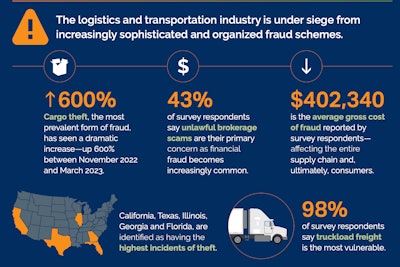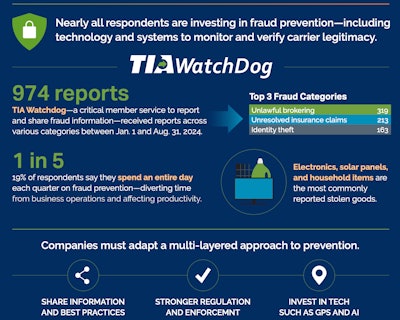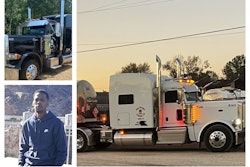The "fraud apocalypse" continues to ravage the trucking industry, with brokers particularly feeling the pain and left explaining to their shipper customers just where their freight went and on whose truck as cargo theft booms 600% and international networks of thieves craft ever more sophisticated angles of attack.
That's according to a new white paper from the Transportation Intermediaries Association, the trade group for freight brokers, which came out on Tuesday.
"The logistics and transportation industry is under siege from increasingly sophisticated and organized fraud schemes," TIA wrote in the paper's introduction. "With a dramatic rise in incidents reported by third-party logistics companies, the need for heightened awareness and robust countermeasures has never been more urgent."
The boom in freight fraud won't be news to Overdrive's readership, who mostly experience it as double brokering, load board scams, or indirectly via the rise of the "carrier vetting" cottage industry's attempts to use algorithms and public data to stem the tide of loss.
[Related: 'Iluminati' hack hits DAT boards with thousands of $20/mile postings]
But even for seasoned veterans of the freight fraud Wild West, the white paper has some shocking statistics, summed up nicely by the below infographic.

TIA President Anne Reinke previously described the freight fraud problem as "existential," meaning a threat to the very existence of freight brokers, and the cargo theft number here likely illustrates why. Within less than 18 months, thieves have figured out how to boost six times as many loads, often targeting electronics, solar panels and other high value items.

When the shipper's load goes missing because it got put on the wrong truck, that can't be an easy conversation for brokers, hence the focus here on full truckload cargo theft. TIA members reported the average gross cost of fraud was "$402,344.47, with an approximate per-load cost of $40,760.17," according to TIA's paper.
[Related: Congress eyes creation of anti-fraud/cargo theft task force]
TIA calling out "unlawful brokerage scams" as the primary concern of 43% those surveyed (TIA members) might stick out to carriers. Interestingly, the entire 12-page TIA white paper does not mention "double brokering," instead lumping that in with other forms of Financial Theft, though it also can involve Data Theft or Identity Theft, other categories in the white paper.
"The rise in fraud is not just a financial burden -- it also increases the cost of goods, affecting the entire supply chain and ultimately impacting consumers," TIA wrote.
The report drills down further into the real cost of the freight fraud situation, and in doing so might just deliver some actionable intelligence for small business trucking operations.
Take a close look at what the second half of the infographic, below, is trying to tell you.

Here's the part carriers already know: Brokers are circling the wagons, adopting tougher-to-meet standards for onboarding carriers and outsourcing some of that carrier vetting work to new upstart companies, which may or may not get the job done.
Why would a broker pay a company like Carrier Assure to do simple due diligence like checking publicly available DOT data? To save time and money. Nearly 70% of TIA members reported spending two or more hours a day on fraud prevention, given as noted fraud incidents routinely crack $40,000 a piece when they involve cargo theft.
[Related: Big change for Carrier Assure? Vetting tool acknowledges shortcomings]
Suddenly, paying services, even multiple services, to vet carriers starts penciling out.
“We utilize two vendors that support the process" in addition to a "dedicated carrier onboarding/carrier risk team," one TIA member said.
“We subscribe to multiple vetting services. We require e-signatures on all rate confirmations. We prohibit sending rate confirmations to email addresses that are not validated by our vetting services," said another.
For brokers trying to prevent fraud, TIA suggests the following: "Common practices involve checking how long a carrier has been in business, verifying information through Secretary of State websites, confirming DOT registration, and ensuring that phone numbers and email domains are valid."
So besides making sure those MC-150s are up-to-date and accurate, successful trucking businesses and brokers Overdrive has interviewed in the past months have all converged on a winning combination to fight fraud: Go with who you know.
Consider putting in the face time with shippers and brokers. First-year owner-op Ilya Denisenko previously pointed out in an Overdrive webinar how meeting brokers face-to-face put him in the front of the line for carrier onboarding with several big brokers.
[Related: First load free? Owners share slick salesmanship tricks, broker icebreakers, more]
Brokers have mentioned the manual steps they take to verify carriers: No pickup numbers until you're on-site, pictures of the CDL and company numbers on the truck. As much of a hassle as these steps may be, they're exactly the kind of work a double broker or freight fraudster wouldn't be able to do.

How do owner-operators and small fleets survive and thrive in tough economic times? Find out in this on-demand webinar.
Register today and watch the on-demand webinar from owner-operators and small fleets as we discuss how they prepared during the good times to weather the storms.
Overdrive previously surveyed readers on the rise of the carrier vetting industry and its impact on broker-carrier relations, and the results weren't pretty. Keep an eye out for final results, but in the meantime, remember: The fraud depicted in this paper represents your customer's pain points.
Nobody ever succeeded in business without having a good solution to their customer's problems.
[Related: Fight double-brokering fraud: Attorney Hank Seaton on prevention, ways to elevate enforcement]











